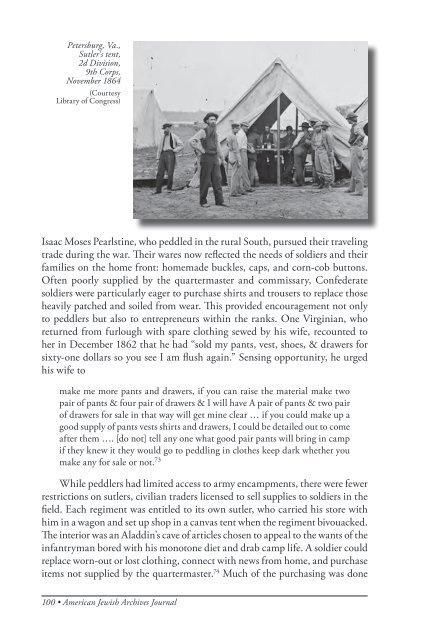American Jewish Archives Journal, Volume 64, Numbers 1 & 2
American Jewish Archives Journal, Volume 64, Numbers 1 & 2
American Jewish Archives Journal, Volume 64, Numbers 1 & 2
You also want an ePaper? Increase the reach of your titles
YUMPU automatically turns print PDFs into web optimized ePapers that Google loves.
Petersburg, Va.,<br />
Sutler's tent,<br />
2d Division,<br />
9th Corps,<br />
November 18<strong>64</strong><br />
(Courtesy<br />
Library of Congress)<br />
Isaac Moses Pearlstine, who peddled in the rural South, pursued their traveling<br />
trade during the war. Their wares now reflected the needs of soldiers and their<br />
families on the home front: homemade buckles, caps, and corn-cob buttons.<br />
Often poorly supplied by the quartermaster and commissary, Confederate<br />
soldiers were particularly eager to purchase shirts and trousers to replace those<br />
heavily patched and soiled from wear. This provided encouragement not only<br />
to peddlers but also to entrepreneurs within the ranks. One Virginian, who<br />
returned from furlough with spare clothing sewed by his wife, recounted to<br />
her in December 1862 that he had “sold my pants, vest, shoes, & drawers for<br />
sixty-one dollars so you see I am flush again.” Sensing opportunity, he urged<br />
his wife to<br />
make me more pants and drawers, if you can raise the material make two<br />
pair of pants & four pair of drawers & I will have A pair of pants & two pair<br />
of drawers for sale in that way will get mine clear … if you could make up a<br />
good supply of pants vests shirts and drawers, I could be detailed out to come<br />
after them …. [do not] tell any one what good pair pants will bring in camp<br />
if they knew it they would go to peddling in clothes keep dark whether you<br />
make any for sale or not. 73<br />
While peddlers had limited access to army encampments, there were fewer<br />
restrictions on sutlers, civilian traders licensed to sell supplies to soldiers in the<br />
field. Each regiment was entitled to its own sutler, who carried his store with<br />
him in a wagon and set up shop in a canvas tent when the regiment bivouacked.<br />
The interior was an Aladdin’s cave of articles chosen to appeal to the wants of the<br />
infantryman bored with his monotone diet and drab camp life. A soldier could<br />
replace worn-out or lost clothing, connect with news from home, and purchase<br />
items not supplied by the quartermaster. 74 Much of the purchasing was done<br />
100 • <strong>American</strong> <strong>Jewish</strong> <strong>Archives</strong> <strong>Journal</strong>
















